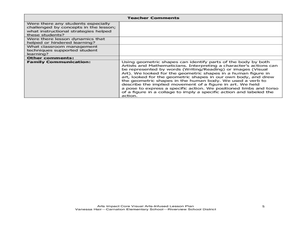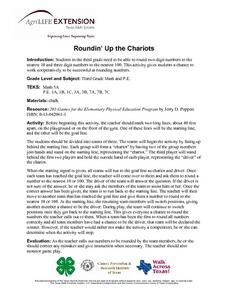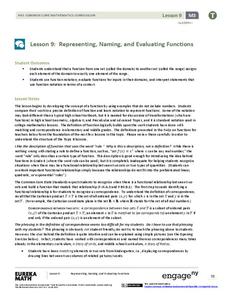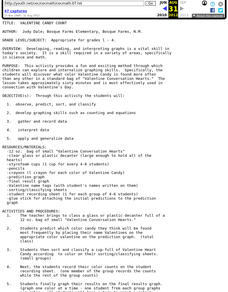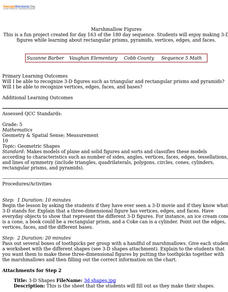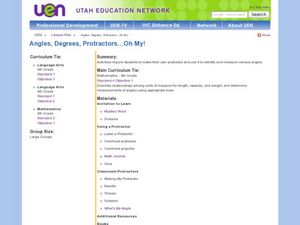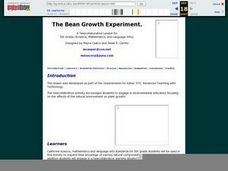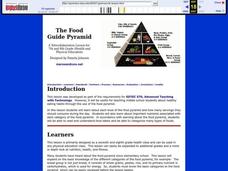Curated OER
Data Analysis and Froot Loops
Use this probability and graphing lesson to have your learners work with a partner to make a necklace out of Froot Loops. They record the cereal colors randomly chosen and strung, graph their data, then use a ratio formula to determine...
Curated OER
Counting on Art
Explore the life and painting style of African-American artist Horace Pippin by looking carefully at its parts, then create a "secret number" painting for a classroom counting book.
Curated OER
Do You Feel Lucky?
Young scholars explore probability by using games based on probable outcomes of events. They name all of the possible outcomes of an event and express the likelihood of such an event occurring.
Curated OER
Bodies In Motion: Shapes and Gestures
Students use geometric shapes to describe body parts. In this geometry lesson, students use geometry vocabulary as they discuss body parts. They practice drawing bodies using shapes based on a wooden model that is poised to show specific...
Curated OER
Mapping the Bone Field: An Area and Scale Exercise
Here is an excellent cross-curricular lesson. Learners relate multiplication to area by making a grid on graph paper, and then creating the same grid in real space outside in the school yard.
Curated OER
Roundin' Up the Chariots
Simulate chariots and driver and practice rounding numbers with your class. In teams of three, they race to the finish line where the teachers asks the chariot driver to round a certain number. They take turns being the driver.
Curated OER
Balloon Bop: Skip Counting
Practice counting in patterns and skip counting by 1, 5, and 10. Once the patterns have been taught, teams of 5 or 6 learners -- holding hands in circles -- skip count each time they collectively bounce a balloon up into the air. Early...
Curated OER
Bubbles Galore
Students investigate bubbles. For this science lesson, students observe how long bubbles last and graph the results of the experiment.
Curated OER
Exploring and Using Shapes to Make a Dance
Second graders use their bodies to create various shapes to make a dance when given various music and beats. In this shapes and dance lesson plan, 2nd graders create lines, curves, twists, and angles with their bodies.
EngageNY
Equivalent Rational Expressions
Rational expressions are just fancy fractions! Pupils apply fractions concepts to rational expressions. They find equivalent expressions by simplifying rational expressions using factoring. They include limits to the domain of the...
EngageNY
Representing, Naming, and Evaluating Functions (Part 1)
Begin the discussion of domain and range using something familiar. Before introducing numbers, the lesson uses words to explore the idea of input and outputs and addresses the concept of a function along with domain and range.
Curated OER
Frisbee Baseball
Students keep track of the number of tosses it takes them to reach each base, and encourage team members and recognize their successes. To make this activity fit the level of older classes, measure distances and figure averages as you play!
Curated OER
Valentine Candy Count
Here is an imaginative take on a classic lesson! Young scholars discover what color Valentine Candy is found more often than any other in a standard bag of Valentine Conversation Hearts. They observe, predict, sort, and classify the data...
Curated OER
Marshmallow Figures
Students enjoy making 3-D figures while learning about rectangular prisms, pyramids, vertices, edges, and faces. After a lecture/demo, students use marshmallows, toothpicks and a worksheet imbedded in this lesson to create 3 dimensional...
Curated OER
Multiplication and Areas
Upper graders solve problems involving measurement of squares and rectangles to practice multiplication skills, finding area, and calculating prices and percentages. A performance assessment is included.
Curated OER
Iron For Breakfast
Third graders are challenged to use scientific thinking, they experiment and observe which objects are attracted to a magnet. Pupils use the evidence to construct an explanation as to what common property the objects attracted to a...
Education World
Predicting Pumpkins
If you want more pumpkin seeds, you should get a bigger pumpkin—right? Young harvesters use estimation skills to make a hypothesis about how many seeds they will find in a pumpkin before examining the real number inside.
Curated OER
Can You Name That Shape?
Learners use materials to build, investigate, and draw two-dimensional shapes (polygons). They combine the shapes they have built and draw from the pile to begin a round-robin activity to name and determine the attributes of a selection...
Utah Education Network (UEN)
Angles, Degrees, Protractors . . . Oh My!
Fourth and fifth graders make a protractor and identify various angle types. In this protractor and angle lesson, learners make their own protractor and use it to measure a variety of angles. They complete worksheets while identifying...
Curated OER
Designing a Playground!
Young scholars design their own playground equipment. In this design lesson, students take pictures of equipment they like and make a class pictograph of their favorite ones. They investigate the design, research equipment around the...
Alabama Learning Exchange
Place Value Party
Help your young mathematicians master three-digit place value with a hands-on activity that builds on their social orientation. They create a place value house from construction paper and sort "number friends" according to which house...
Visa
Money Responsibility
Introduce young learners to the important life skill of responsibly managing money and recording how much they spend and save.
Curated OER
The Bean Growth Experiment
Fifth graders use modern technologies which allow them to gain a new, dynamic, and intersting understanding of themselves, their community, and the world. They focus on environmental education and the effect of the environment on plant...
Curated OER
The Food Guide Pyramid
Students examine each level of the food pyramid and how many servings they should consume during the day. They study the important nutrients associated with each category of the food pyramid.
Other popular searches
- Elementary Math Lessons
- Elementary Math Patterns
- Elementary Math Worksheets
- Elementary Math Survey
- Elementary Math Addition
- Elementary Math Assessments
- Elementary Math Lesson Plans
- Math Table. Elementary Math
- Elementary Math Tests
- Elementary Math Survey\
- Elementary Math Survey Bias
- Math Table Elementary Math





